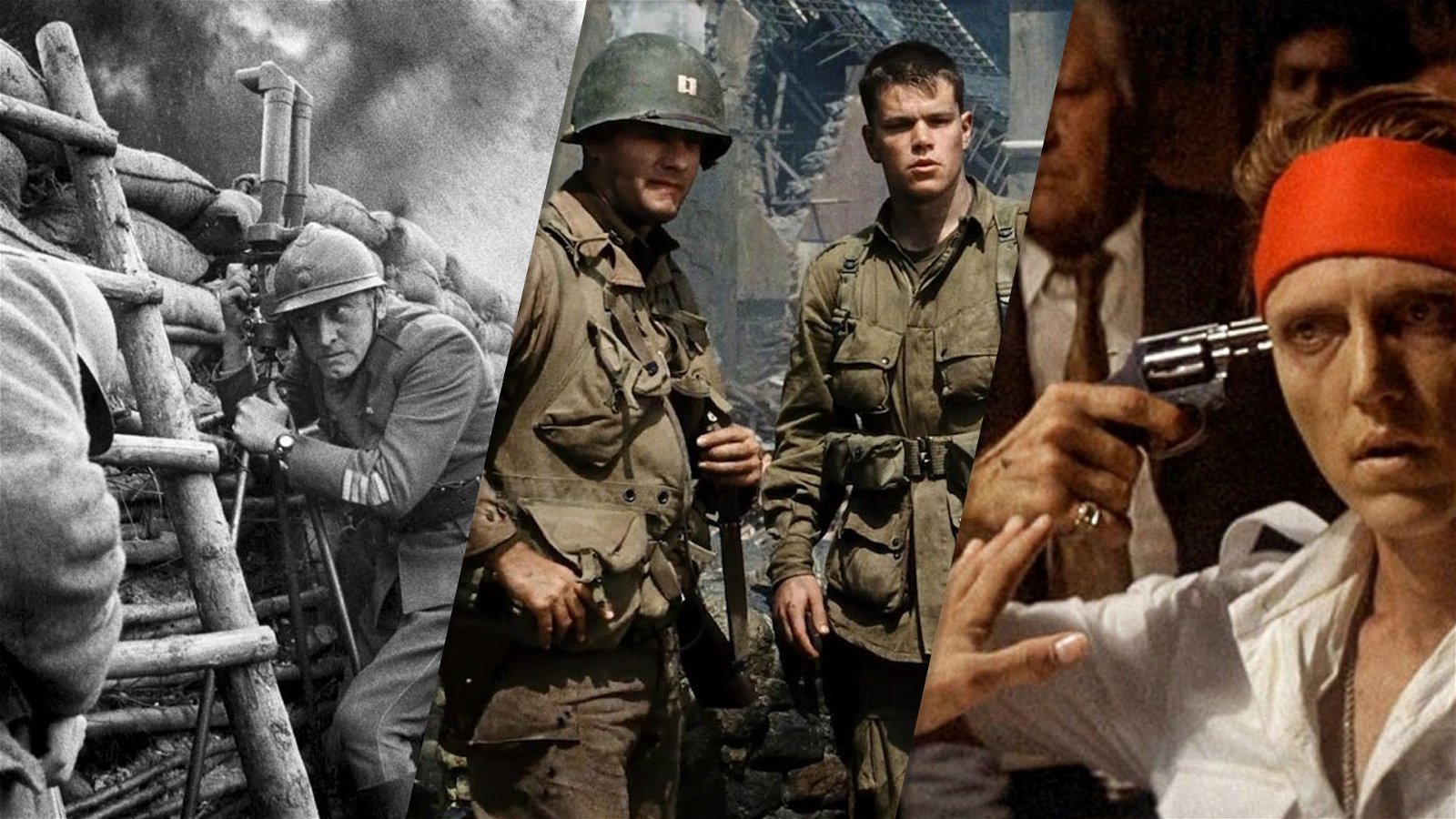War. What is it good for? According to the song, absolutely nothing. However, it has been responsible for decades worth of riveting cinema. The War Film is a genre founded on military propaganda that has grown into something far more complex. The greatest war movies offer their filmmakers a chance to flex their directorial muscles in ways that show off a skill with spectacle and visceral cinematic artistry while also offering resonant commentary on the human condition through our most devastating of actions and tragedies. It’s a rich genre filled with brilliant artistry and harsh truths, one that sadly continues to thrive since we can never seem to get over the whole “war” thing as a species.
So, in keeping with our month-long exploration of depictions of war across all our favourite media, the time has come for your friendly neighbourhood CGM critic to talk up war movies. However, rather than doing a simple listicle, I thought I’d try something different. There are simply too many war movies to rank and too much controversy involved in getting that ranking wrong. So instead, my top five list of war films will be broken down into the best film representing a different war of the 20th century. It allows for a little more variance and exploration. No two wars are alike after all, and neither are the ways in which some of the finest filmmakers of their eras explored the wars they lived through. So without further ado, let’s get down to talkin’ war movies, people!
The First World War: Paths of Glory (1957)
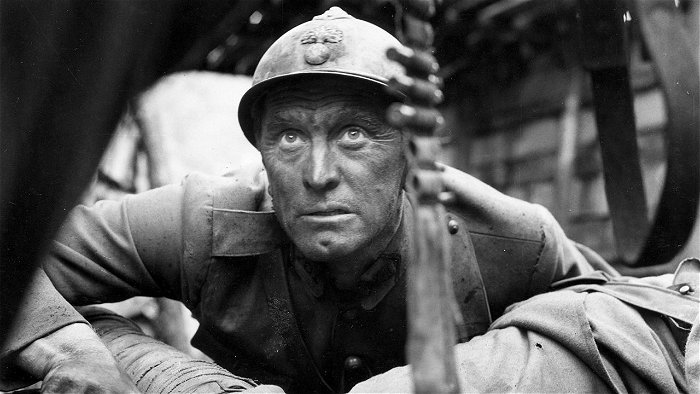
The first of many movies about war that Stanley Kubrick made over his career, in many ways Paths Of Glory remains his most potent statement on the subject. Without a doubt, it’s one of the best and most unsettling depictions of the trench warfare of the First World War. Through a series of his trademark long tracking shots, Kubrick vividly depicts the long, muddy, and inhumane trenches where soldiers waited to fight, as well as showcasing the impossible task of surviving a march through No Man’s Land. It’s vicious and nasty, far removed from any of the more heroic and stylized visions of the conflict that had appeared on screen at the time. More than that, Kubrick’s story presents a morality play within a messy war that defied rationality and had little in the way of easily identifiable heroes and villains. The film is about a group of soldiers who refuse to participate in an attack that’s an open suicide mission dictated by inhumane generals and who are then tried for death for their “crimes.” It’s a fascinating and illuminating exploration of the irony and insanity of war, where human lives are often considered little more than statues on a game of Risk by generals who never see combat. No war embodied those themes more than the First World War, and no film could say it better than Stanley Kubrick’s Path’s Of Glory. A masterpiece.
The Second World War: Saving Private Ryan (1998)
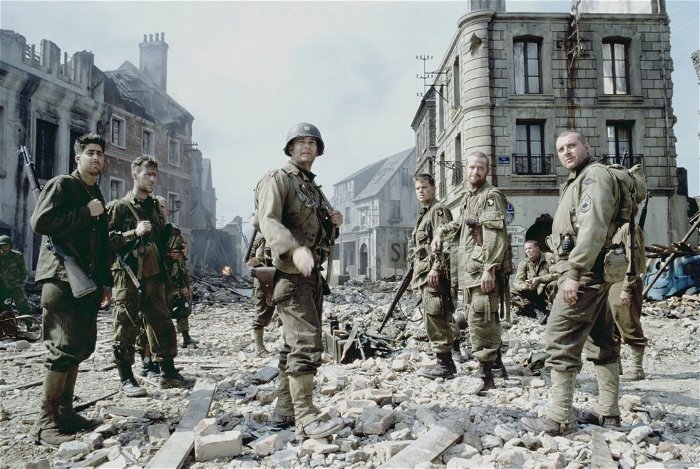
No war has received more cinematic treatments than the Second World War and that’s likely because it’s one of the few wars with clear cut morality, heroes, and villains. It clear-cuts sense to pick Steven Spielberg’s masterful “men on a mission” tale Saving Private Ryan for this slot. Sure, the movie raises moral questions and depicts the madness of war, yet for the most part it’s a very clear combat tale with grand heroic gestures and satisfying catharsis. I mean, it stars Tom Hanks for godsakes. Obviously, that removes any sense of moral ambiguity. Yet, despite the all the ra-ra war movie rousing on display, Spielberg never loses sight of the horror and pain of combat. The opening D-Day sequence remains the most visceral, violent, and horrifying battle sequence ever shot, thrusting audiences headfirst into the madness and mayhem of D-Day without holding back anything. In that way, Saving Private Ryan is one of the most brutal and realistic war films ever made, just housed within a clear cut morality play for one of the few wars that can be broken down into black and white. It is probably the best of all Second World War films for a variety of reasons. Plus, the movie also gave Vin Diesel one of his first major roles. That’s important too.
The Korean War: M*A*S*H* (1971)
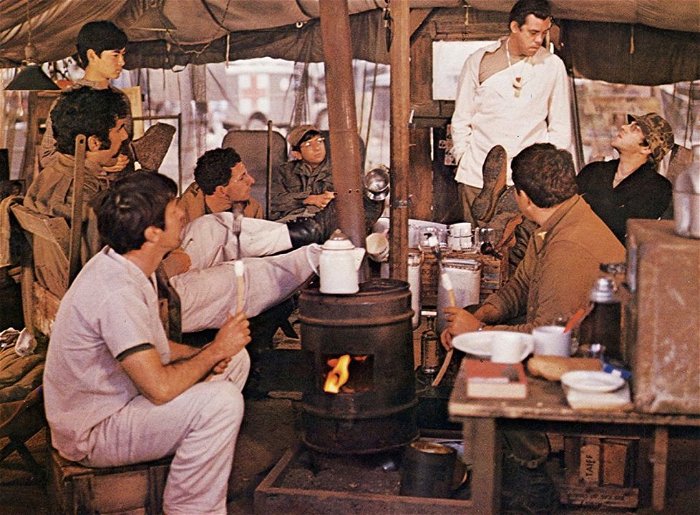
Ah yes, the forgotten major war of the 20th century. The Korean War is rarely discussed these days despite the massive loss of life and rarely has it ever been depicted on film. There is one masterpiece based on that war though, although it’s been somewhat forgotten. The M*A*S*H* TV series has long overshadowed Robert Altman’s ground-breaking film, despite being nowhere near as interesting. Sure, there’s no combat shown in this wacky romp about war surgeons on the battlefield. However, that’s because the movie focuses on a very different side of being a soldier. The men in M*A*S*H* were drafted into a war they never believed in or wanted to fight, yet they serve by performing surgery in bloody scenes played in a straight and horrifying manner. In between saving lives and surviving stressful duty, the M*A*S*H* gang blow off steam through their own brand of anti-authoritarian madness. It’s a unique exploration of the effect being in a war zone can have on the minds of those who serve and the ways in which they escape through their own forms of playful madness to avoid succumbing the real thing. There’s a lot going on in the movie for those who care to look and even decades later Altman’s oddball war comedy remains one of the most unique, unconventional, and thoughtful explorations of life on the battlefield. Sure, it kind of falls apart somewhere near the odd football finale, but hey! The fact that this film manages to say so much about war and life in the army without actually showing combat is still quite a special achievement worth savouring.
The Vietnam War: The Deer Hunter (1978)
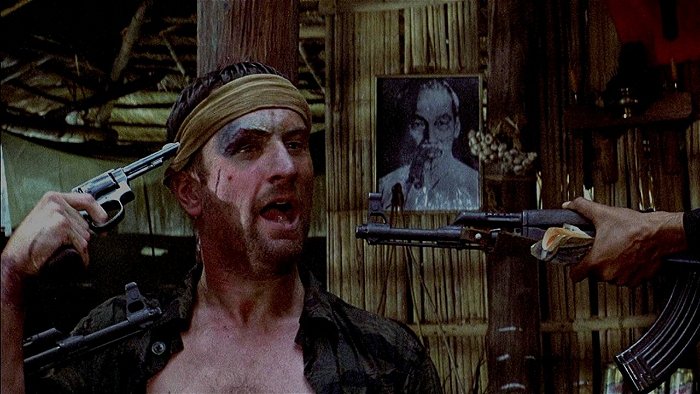
First off, it has to be stated that The Deer Hunter is not a particularly accurate depiction of the Vietnam war, but that’s not the point. Michael Chimino’s masterful epic is a fable. It’s the tale of a group of small town men who sign up for war in an act of macho patriotism and find themselves thrust into a messy madness that in no way represents their masculine fantasies. They emerge either broken or hailed heroes in ways they never quite understand and even their friends and family who never left for the battlefield find their lives scarred and forever changed. It’s a beautiful film that explores war as a reoccurring sickness that forever harms and alters every life it touches. Given that Vietnam was such a troubled and confused war, no movie captured the effects and pains of battle better (even if the historical details weren’t quite right).
The Gulf War: Three Kings (1999)
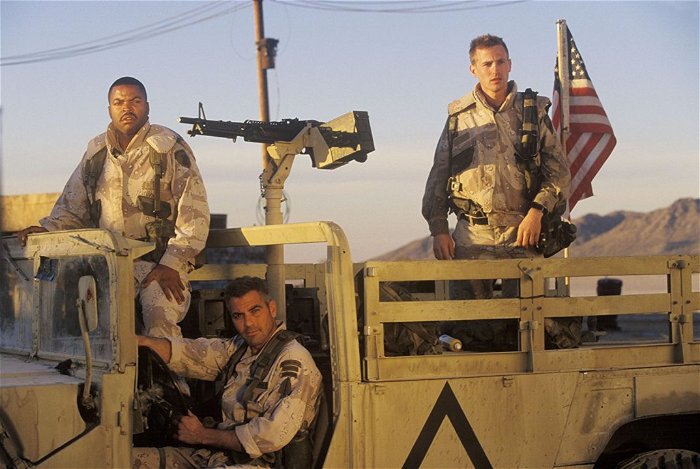
David O. Russell’s Three Kings is one of the strangest films ever made about war, rooted in the possibly the oddest and least explicable conflict of the 20th century. George Clooney, Mark Wahlberg, and Ice Cube star as a trio of confused soldiers in Bagdad celebrating the end of a war that they barely participated in. After a hot tip found in a bum (don’t ask), they discover a hidden hideaway of Saddam Hussein’s gold and decide to stage a heist. Obviously everything goes wrong, but at least goes wrong in ways that make them finally understand the pain suffered by those who lived under Saddam’s regime. As a result, they finally decide to do something right.
The wild movie starts as a strange comedy before slowly morphing into something far more humane and meaningful. In a way, it perfectly captures the sentiment of soldiers in both of the recent Iraq Wars; young men who entered the service as a job and are forced into fighting a conflict that they’ll never truly understand. Yet even within that painful and confused place, it is possible to find a way to be a hero as long as you actually care about helping people rather than battling for political gain. Heady stuff for such a gleefully entertaining movie, but definitely the style of war film we deserve in such a morally and politically confused era for armed conflict.
